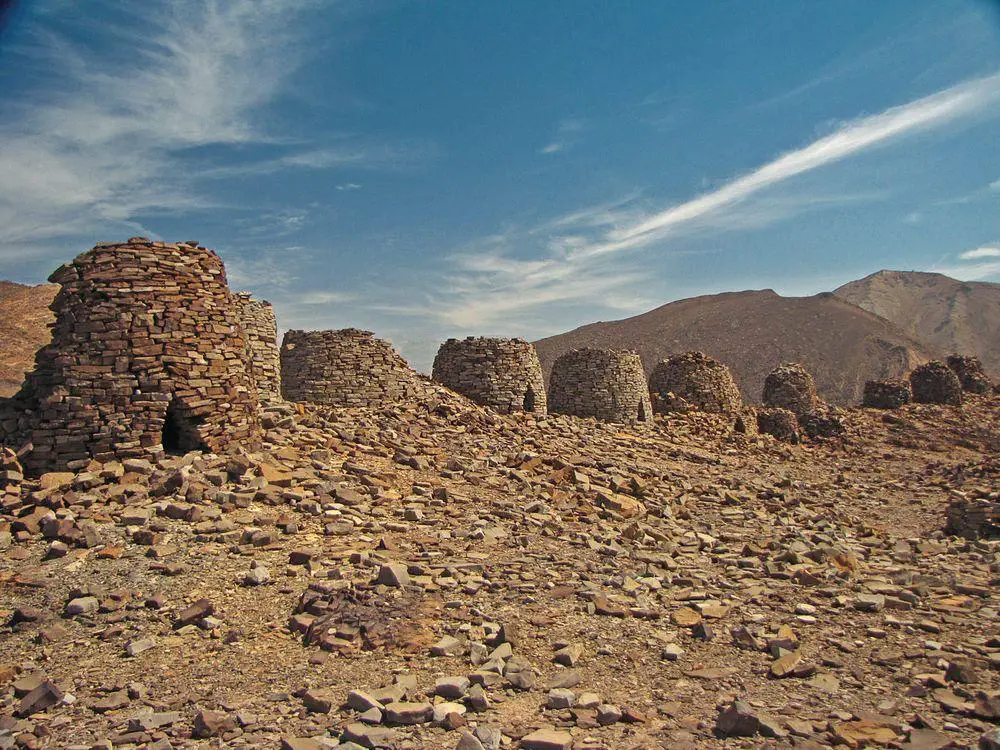Wondermondo 🢖 World 🢖 Wonders of Asia 🢖 Wonders of Oman
Territory
Wonders of Oman
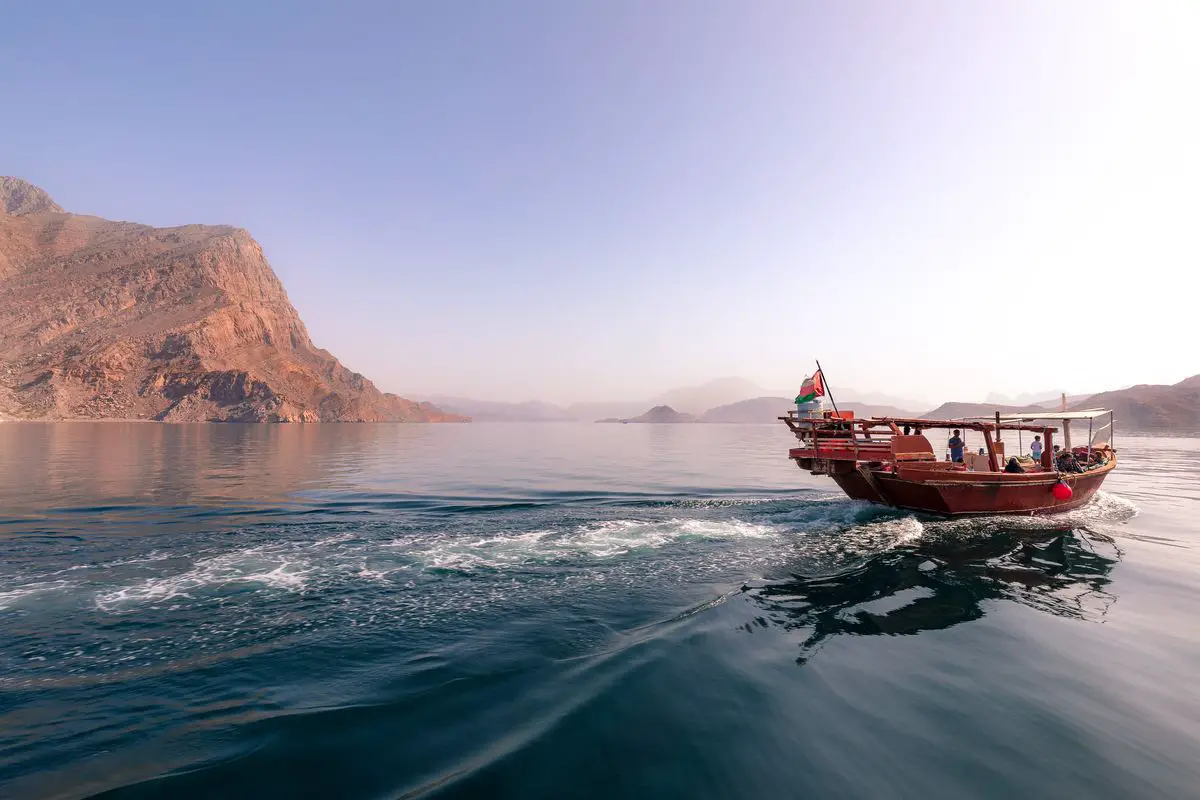
 Highlights
Highlights
Southern Arabia is an embodiment of fantasies about the mysterious, beautiful Arabia from One Thousand and One Nights. Oman with its breathtaking landscapes and mysterious monuments of history definitely represents a part of this realm.
Map with the described wonders
If you see this after your page is loaded completely, leafletJS files are missing.
 Top 25 wonders of Oman
Top 25 wonders of Oman
Geological wonders
Majlis al Jinn (Khoshilat Maqandeli)
Ash Sharqiah Region
Ninth largest cave chamber in the world in a unique setting, available only by abseiling 118 – 158 meters from the ceiling through a comparatively small hole. People live on the top of this enormous chamber that has only 40 meters thick ceiling. The cave contains one of the largest cave chambers in the world – 340 m long and 228 m wide, 150 m tall, floor area is 58,000 m².
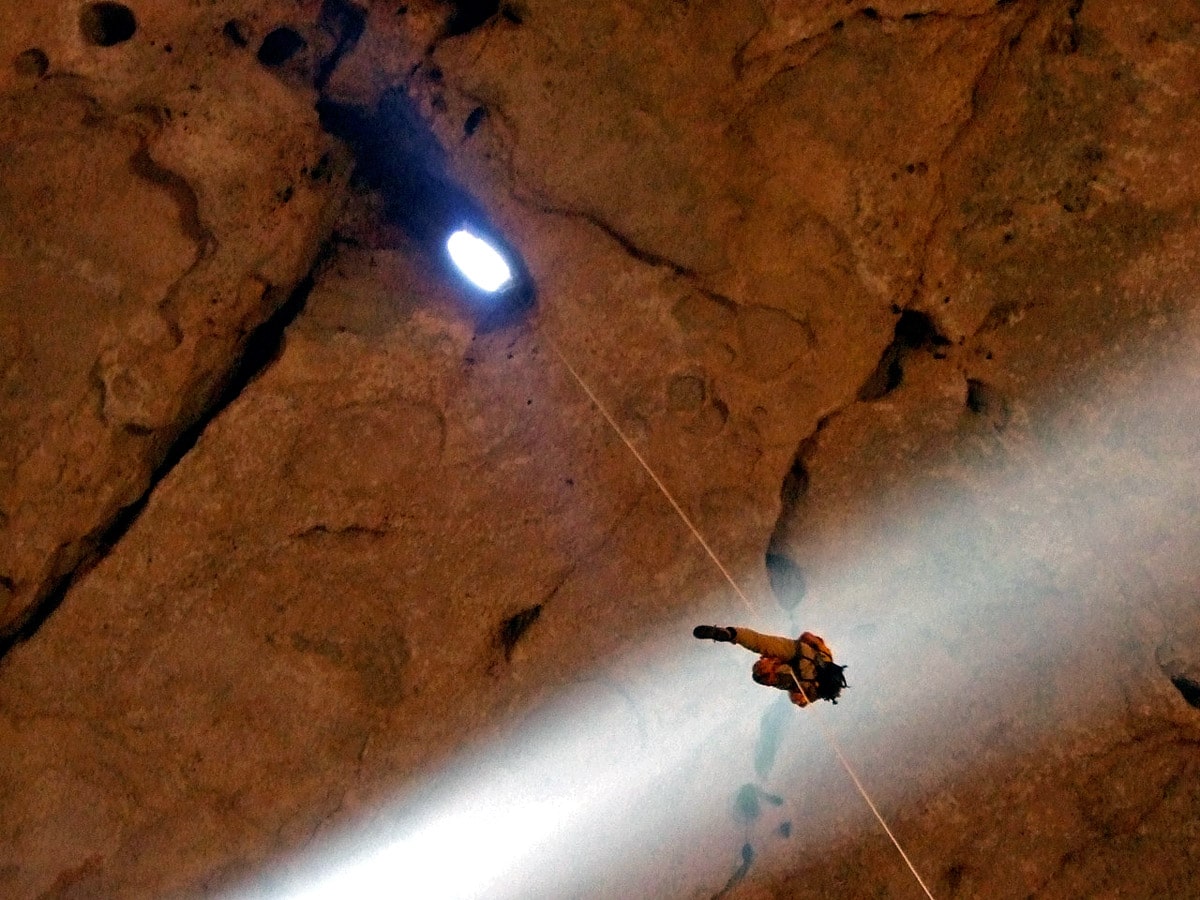
Grand Canyon of Wadi Ghul (Wadi Nekhar)
Ad Dakhiliyah Region
The most impressive canyon in Oman, with cliff sides up to 1,000 m high.
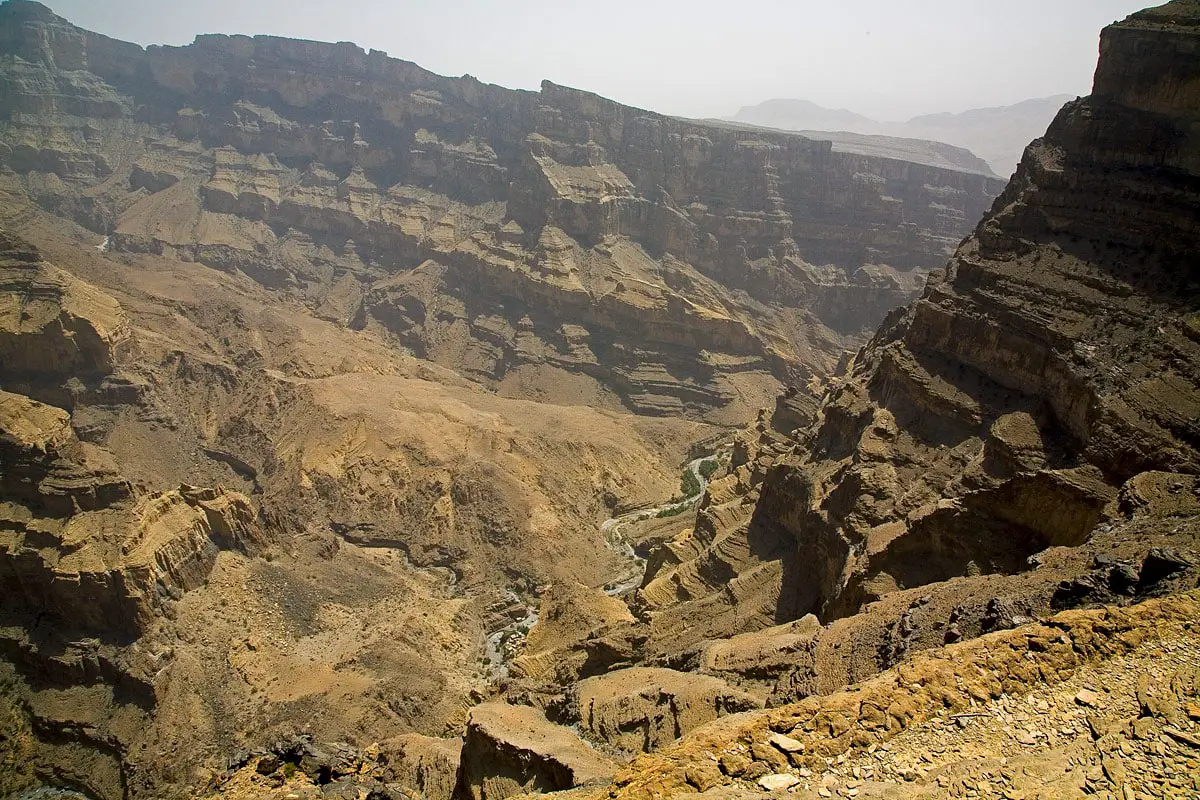
Tawi Atair (Tawi Atayr)
Dhofar Governorate
Enormous collapse doline, 211 m deep, up to 150 m wide, with vertical walls around. The sinkhole is full of life: numerous birds and plants. Cave lake contains endemic fish – the only freshwater fish in a 600 km radius.
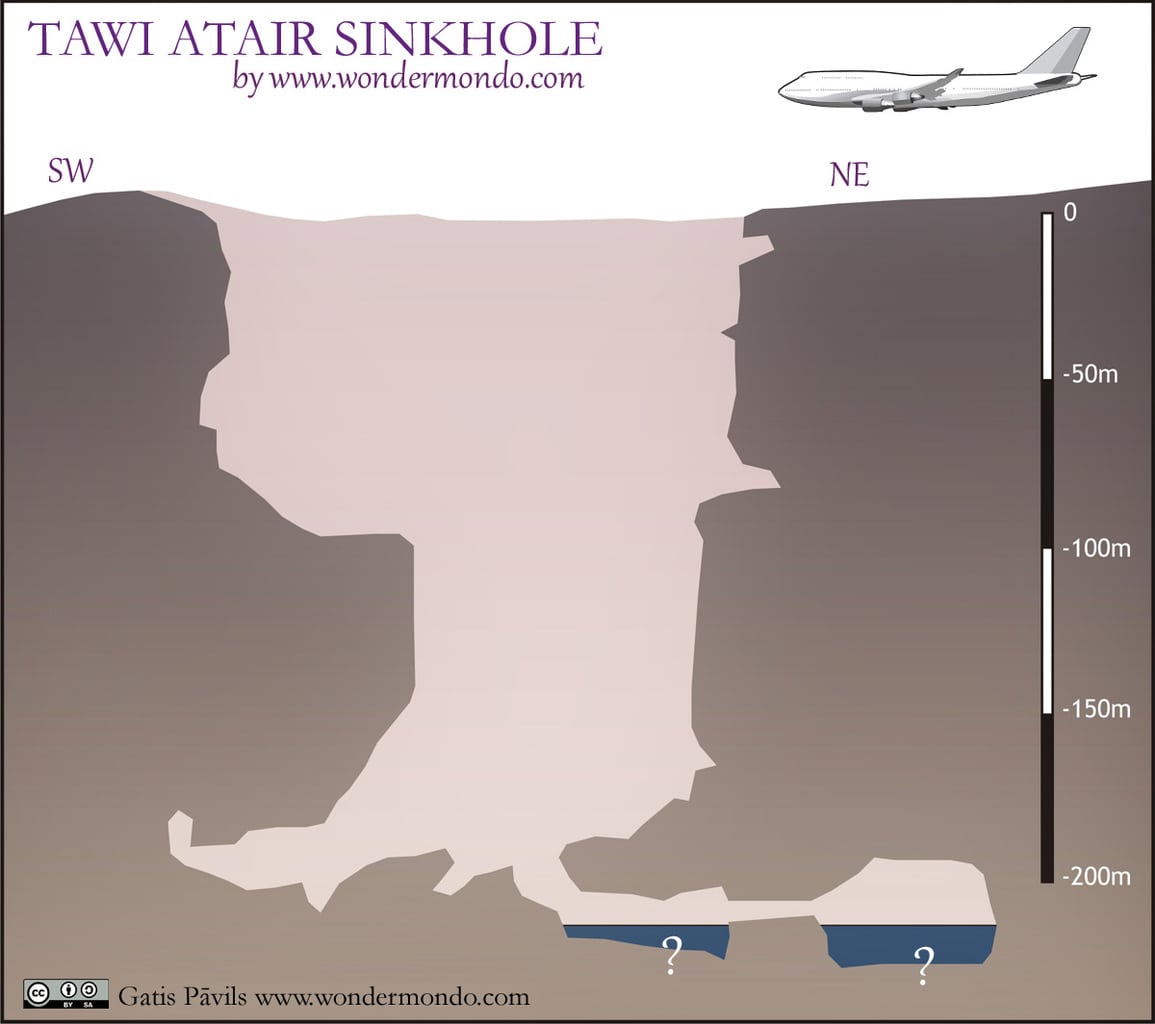
Teiq sinkhole (Taiq, Tayq, Tahik)
Dhofar Governorate
1.25 km long, 1 km wide, and 250 m deep sinkhole with abrupt walls, volume 90 million m³ – the largest sinkhole by volume in the world. Two perennial streams enter the sinkhole and both disappear underground. Contains also a largely unexplored cave.
Bimmah Sinkhole
Muscat Governorate
Approximately 30 m deep sinkhole with a deep blue lake in it. A beloved place for swimming, and the best-known sinkhole in Oman.
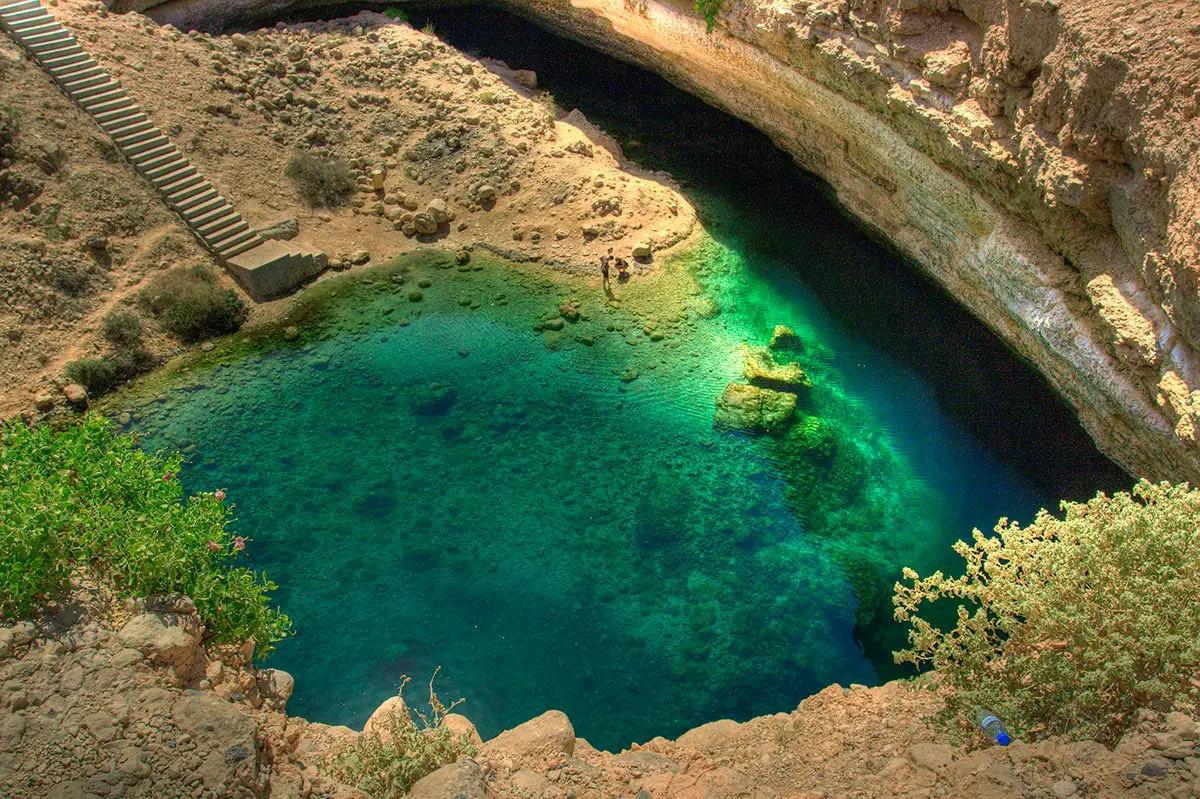
Wadi Darbat Falls (Dharbat, Dirbat Falls)
Dhofar Governorate
The cliff face of Wadi Dharbat during the monsoon (Khareef) period in June – September becomes adorned with up to 150 m tall falls. The whole cliff face is more than 1 km wide, but the waterfall does not take the whole width. Waterfall deposits lime and there have formed impressive tufa formations.
Jebel Misht
Ad Dhahirah Region
The south-east face of this mountain (2090 m above sea level) is an abrupt, 850 – 900 m tall cliff. This is considered to be the tallest cliff in the Arabian peninsula. (Could be in Ad Dakhiliyah Region).
Biological wonders
Stand of baobabs in Wadi Hinna
Dhofar Governorate
Group of more than 100 baobabs (Adansonia digitata) with trunk circumferences up to 20 meters (some sources state – even 29 meters)! Relict forest, although some consider that baobabs are brought here by people. Baobabs are found also more to the west, around Dalkut, in beautiful, idyllic scenery.
Juniper woodland of Hayl Al Jawari
Al Batinah Region, Ad Dakhiliyah Region
Unique montane woodland in the highest mountains of Oman, at a height above 2,200 m. Forest has a single species of trees – very old Greek junipers (Juniperus excelsa). Some specialists consider that this very isolated population of junipers has a distinct, endemic species: Greek junipers in general grow further north, in Turkey, and Greece.
Archaeological wonders
Khor Rori
Dhofar Governorate
Remnants of an enormous, ancient fortress from the end of the 1st century BC. Ancient, once very rich port, used for transport of frankincense since Neolithic times. Legendary site.
The Necropolis of Bat
Ad Dhahirah Region
One of the largest necropolises from the 3rd millennium BC in the world. In the central part there are built more than 100 vaulted stone tombs with two three chambers in each. Outside this central area, there are several more hundreds of tombs. The site includes some 20 mysterious buildings with unknown purposes. Found remnants of pottery.
Rustaq Fort (Rostaq)
Al Batinah Region
Very impressive fort, built in the 4th century AD, reinforced in later times. Walls are up to 3 m thick.
Ibra beehive tombs
Ash Sharqiah Region
Well preserved, up to 10 m tall dry stone settings dispersed along the rims of Selma Plateau. These Bronze Age tombs (sometimes around 3000 BC) have been shaped like beehives. These cones have a surprisingly high build quality.
The Necropolis of Al-Ayn
Ad Dhahirah Region
Well preserved necropolis from the 3rd millennium BC. Group of 21 impressive dry stone tombs formed like beehives, placed in a row. The largest tombs are up to 4 m high.
Tawi petroglyphs
Musandam Governorate
Group of ancient petroglyphs, depicted boats, animals, and warriors. In Oman are located multiple sites with prehistoric petroglyphs.
Ancient Shisr oasis (Ubar)
Dhofar Governorate
This legendary city was rediscovered in 1992. Neolithic settlement in an ancient oasis, for many thousands of years, served as a station of transport of frankincense to the north. Iron Age fortress was built here in the 2nd century BC. Largely abandoned in the 3rd century AD.
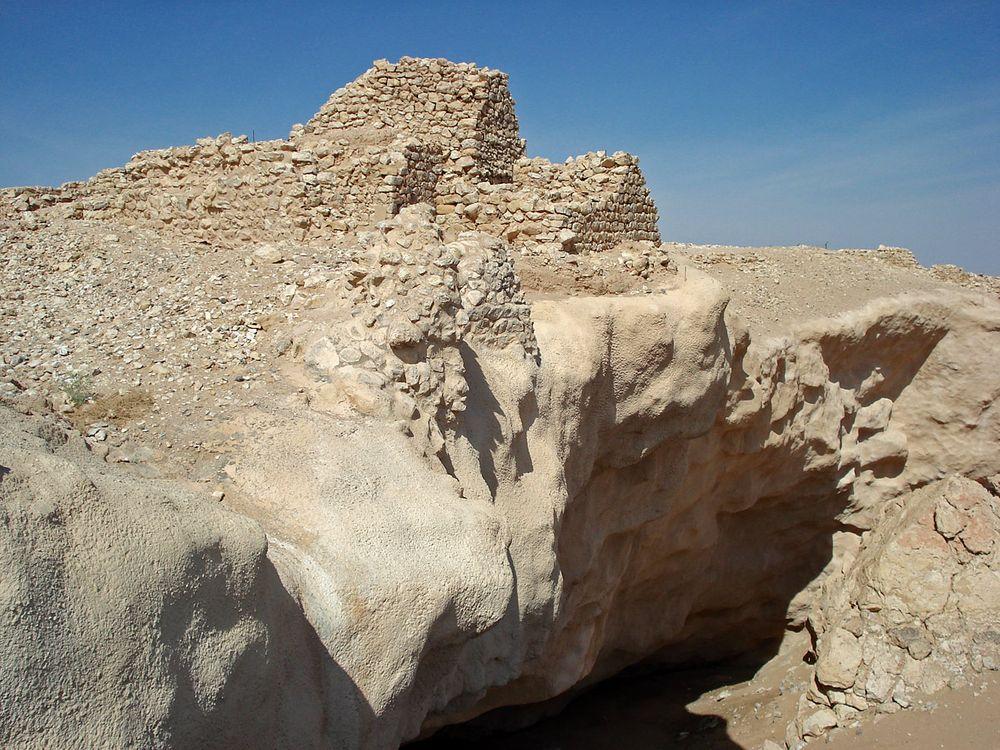
Al Balid (Old Dhofar, Al Blaid)
Dhofar Governorate
Ancient, once rich, and significant city. Developed since the Iron Age and flourished until the 12th century AD. Nowadays remain only the foundations of buildings including the remnants of the Great Mosque.
Khor Rori megalith
Dhofar Governorate
Bronze Age stone setting – ceremonial center – from 3000 – 1200 BC, located on a promontory and overlooking the natural harbor below.
Megalithic tower of Al-Khutm (Al-Khutum)
Ad Dhahirah Region
Well preserved, a slightly oval tower with several enclosures. Possible Bronze Age settlement around the central fortification.
Architecture wonders
Nakhal Fort
Al Batinah Region
One of the best-preserved historic forts in Oman. Looks very imposing, as it is located on a rocky outcrop. Possibly built already before the introduction of Islam, reinforced in the 10th and 17th century AD.
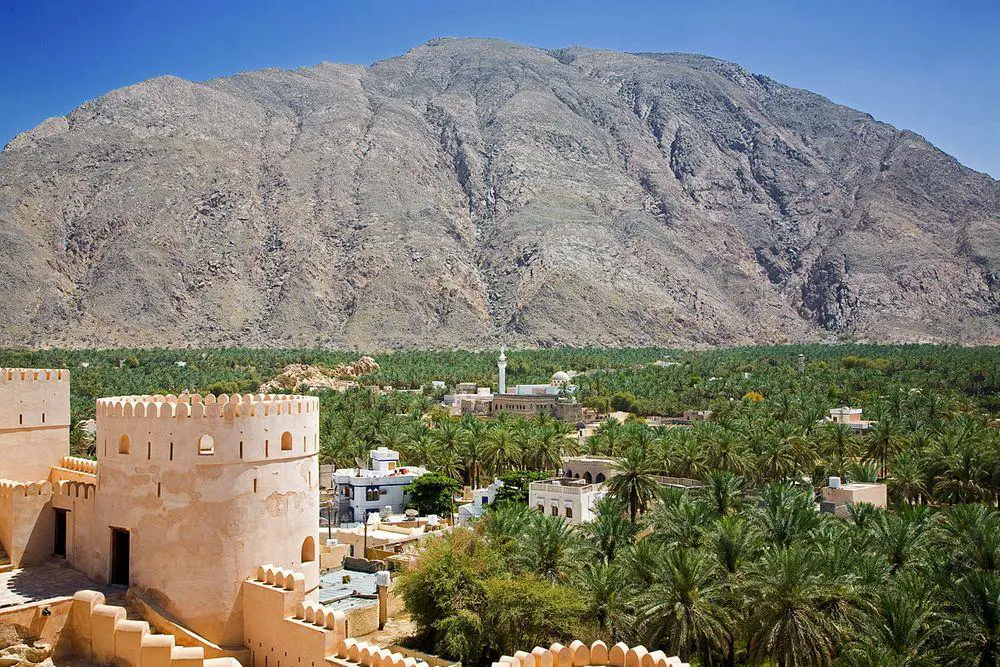
Bahla Fort
Ad Dakhiliyah Region
An impressive fort, built in the 13th – 14th centuries AD. The structure rises up to 50 meters high.
Falaj Daris
Ad Dakhiliyah Region
One of the oldest falaj – sophisticated water supply systems – in Oman. The total length of the three channels is 7,990 m. Falaj supplied the ancient city center of Nizwa. The age of the system is unknown – but it is still working and governed by local people. This is just one example of more than 3,000 ancient and medieval water supply systems in Oman.
Falaj Al-Malki
Ad Dhahirah Region
One of the oldest falaj – sophisticated water supply systems – in Oman. The total length of the system is 14.8 km. Falaj supplied the ancient cities of Nazar and Al-Yaman. The age of this system is unknown but it is still working and governed by local people.
Ancient City of Galhat (Qalhat)
Ash Sharqiah Region
Once upon a time very important and prosperous port city, flourished in the 13th – 14th centuries AD and declined in the 16th century. Now only ruins and countless shards of imported Persian and Chinese wares cover the area of this once-enormous city.
Nizwa Fort
Ad Dakhiliyah Region
Built in 1668 AD, one of the historically most important buildings in Oman – the administrative seat of presiding Imams and Walis.
 Recommended books
Recommended books
The Rough Guide to Oman
The Rough Guide to Oman is the ultimate travel guide to one of the world’s most exciting emerging tourist destinations. With clear maps and detailed coverage of all the best Oman attractions. Discover Oman’s highlights in the full-color introduction packed with stunning photography and information on everything from experiencing, an oasis of traditional culture to the frantically modernizing Gulf states. Find detailed practical advice on what to see and do in Oman, relying on up-to-date descriptions of the best hotels, bars, clubs, shops, and restaurants for all budgets.
Insight Guides Oman & the UAE
Insight Guide Oman and the UAE is an essential guide to two jewels of the Middle East, brought to life with hundreds of evocative photographs. Our inspirational Best of Oman and the UAE section highlights the countries’ unmissable sights and experiences, while a comprehensive Travel Tips section gives you all the practical information you need to plan your trip, and our selective listings bring you the best restaurants and activities on offer.

